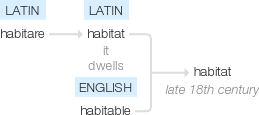Habitat
late 18th century: from Latin, literally ‘it dwells’, from habitare (see habitable).
wiktionary
From Latin habitat(“it dwells, lives”), the 3rd person singular present active indicative form of habitō(“I live or dwell”). In Linnaeus and similar authors, the geographical ranges of species were customarily denoted in Latin by a sentence beginning with "Habitat", e.g. "Habitat in Europa" ("It lives in Europe"), and it thus became the convention to refer to the geographical range as the "habitat". Compare the English derivations of exit and ignoramus from Latin finite verbs reanalyzed as English nouns.
etymonline
habitat (n.)
"area or region where a plant or animal naturally grows or lives," 1762, originally a technical term in Latin texts on English flora and fauna, literally "it inhabits," third person singular present indicative of habitare "to live, inhabit, dwell," frequentative of habere "to have, to hold, possess" (from PIE root *ghabh- "to give or receive"). This was the Modern Latin word that began the part of the scientific description of a plant or animal species that told its locality. General sense of "dwelling place" is first attested 1854.
